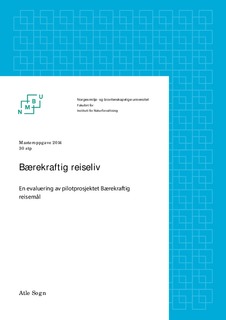| dc.description.abstract | Bærekraftig utvikling er et begrep som er gjenstand for mye diskusjon når det gjelder tilnærming, hva det er ment å omfatte, og hvilke tiltak som er nødvendig. Det samme gjelder for begrepet bærekraftig reiseliv, som er oppfattet som tett knyttet til bærekraftig utvikling. Denne oppgaven fortar en evaluering av pilotprosjektet Bærekraftig reisemål, som inngår i prosjektet Bærekraftig reisereiseliv 2015. Evalueringen handler på den ene siden om å identifisere hvilken forståelse av begrepene bærekraftig utvikling og bærekraftig reiseliv pilotprosjektet representerer, og på den andre siden vurdere pilotprosjektets bidrag til en bærekraftig utvikling. Dette gjøres gjennom en analyse av operasjonaliseringen av begrepene gjennom de ti prinsippene for et bærekraftig reiseliv, standarden for et bærekraftig reisemål og Trysils besvarelse av denne. Resultatene viser på den ene siden at tilnærmingen til begrepene er uttydelig, og at det er svake sammenhenger i operasjonaliseringen. Disse funnene er knyttet sammen ved at operasjonaliseringen mangler et tydelig og presis målsetning som klargjør hva som skal operasjonaliseres, men funnene viser også at det er et potensial for forbedring av standarden på tross av dette.
Pilotprosjektet innebærer en sertifiseringsordning, som har ført til at Trysil er tildelt merket Bærekraftig reisemål, som bygger på et reisemåls besvarelse av standarden. Standarden er å anse som en operasjonalisering av de ti prinsippene for et bærekraftig reiseliv. Trysils besvarelse tilfredsstiller kun halvparten av de ti prinsippene for et bærekraftig reiseliv. Dette kan tyde på at merkeordningen bidrar til at sertifiserte reisemål fremstår som noe de ikke er.
Denne oppgaven viser at pilotprosjektets bidrag til en bærekraftig utvikling er begrenset, og at bærekraftig reiseliv slik det er operasjonalisert gjennom pilotprosjektet begrenser seg til å innebære en bærekraftig reiselivsnæring som tar hensyn til sitt eget ressursgrunnlag. Dersom standarden oppfattes som et forvaltningsverktøy, kan den imidlertid ha et potensial som et nyttig instrument for å bidra til et mer miljøvennlig reiselivs. Det er imidlertid slik at det meste tyder på at økonomisk vekst fremdeles vil gå på bekostning av naturgrunnlaget. En slik utvikling vil føre til at reiselivets negative påvirkninger også i fremtiden vil øke, og at bidrag til et mer miljøvennlig reiseliv begrenser seg til å handle om at disse negative påvirkningene ikke blir får så store konsekvenser enn ellers ville innebære.
Nøkkelord: Bærekraftig utvikling, bærekraftig reiseliv, ti prinsipper for et bærekraftig reiseliv, standarden for et bærekraftig reisemål, evaluering, operasjonalisering, begrepsvaliditet
The term Sustainable development has been subject to heavy discussions in terms of approach, perceptions of what the term contains, and what kind of measures that is required.
The same applies to the related term sustainable tourism. This paper conducts an evaluation of the pilot-project Sustainable destinations, which is a part of the project Sustainable tourism 2015. The evaluation is on the one side aimed at identifying the perception of the terms sustainable development and sustainable tourism that the pilot-project represent, and on the other evaluate the pilot-projects contribution to a sustainable development. This is conducted through an analysis of the operationalization of the terms through the ten principles of sustainable tourism, the standard of sustainable destinations and the answers to this standard given by Trysil. The paper findings reveal that the approach towards both terms is indistinct, and that there is a weak coherence through the operationalization. These findings are connected through the lack of a distinct and precise objective that is able to clarify what the target of this operationalization is. However, the findings in this paper points to the potential of improving the standard despite of this shortcoming.
The pilot-project includes a certification of sustainable destinations, which Trysil has been awarded. This award is a result of the evaluation of the destinations answers to the standard of sustainable destinations. The standard is to be considered as an operationalization of the ten principles of sustainable tourism. The findings in this paper imply that the awarded destinations appear to be something that is not in coherence with what they actually are.
This paper shows that the pilot-projects contributions to a sustainable development are limited, and that sustainable tourism in the way that it is operationalized through the pilot-project, is limited to a perception of sustainable tourism as an tourism enterprise that takes into account its negative impacts on its own resources. If the standard is perceived as a tool for management, it might have a potential as an instrument for a more environment-friendly tourism. However, there are indications that imply that economic growth will prevail on the expense of the environment. Such development will imply further negative impacts caused by tourism, and ultimately that the contributions to a more environment-friendly tourism is limited to prevent these impacts to be less substantial than they otherwise would be.
Keywords: Sustainable development, sustainable tourism, ten principles of sustainable tourism, the standard of sustainable destination, evaluation, operationalization, construct validity | nb_NO |
